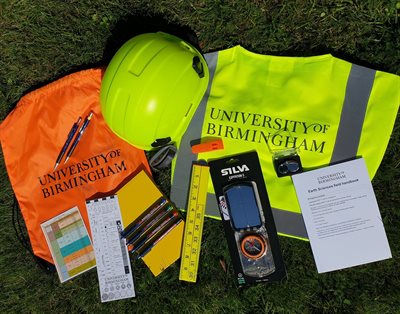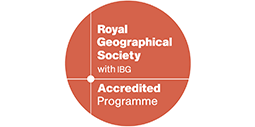Fieldwork is an essential element of our degree programmes, and here at Birmingham we have an outstanding reputation for providing students with high quality field training. The costs of travel and accommodation on all compulsory field courses will be covered by the University.
Recent fieldwork destinations have included Pembrokeshire, the Scottish Highlands, southern Spain, Berlin, Malta, Portugal and Tenerife.
Earth Sciences fieldwork
Fieldwork - Geological mapping
As a Geology student, you will spend up to 80 days in the field depending upon your specific programme. If studying Palaeontology and Geology or Geology and Physical Geography you will be involved in geological fieldwork for about half this time
Fieldwork is arranged with a significant portion undertaken during term time. In each of the first two terms, one week is dedicated to field studies and associated work. We offer a range of residential trips to Northern Ireland, Pembrokeshire, the Scottish Highlands, Dorset and Cornwall, southern Spain and Tenerife. These courses have specific elements designed for the different degree programmes and some courses, such as the North West Scotland trip, are entirely separate. During these courses you will be given a rigorous training in field techniques. Both group and individual work are included in your training and your confidence in your fieldwork competence and ability will grow with each successive course.
See Earth Sciences programme pages for more information about fieldwork.
Costs and funding
- The costs of travel and accommodation on all compulsory taught field courses will be covered by the University. Currently this amounts to around 40 days of support over a three-year BSc degree and 45 days over a four-year MSci degree.
- The majority of field courses are self-catered and students are expected to purchase meals.
- Students following the Geological Society-accredited programmes within Earth Sciences are required to complete independent field-based projects varying in length from one to six weeks. Geology students undertake an independent mapping project in an area of their choice, and we suggest a range of suitable locations which are supported by supervisor field visits. Recent mapping areas include several sites in the UK, as well as Ireland, Spain and France, and some students undertake their project in collaboration with an industrial partner. Other students travel further afield, to locations such as the USA and New Zealand, but we are not able to offer supervisor visits in these locations. To support their dissertation fieldwork, we offer all Geology students a £500 bursary towards their costs. Students typically work in groups, which reduces individual costs. Depending on the destination, the cost per individual is estimated to be between £400 and £600, although we also offer field areas local to the West Midlands, which enables some students to minimise their field costs. Additional financial support may be available to students from external sources. For example, in recent years several students have received contributions of £250 from the Warwickshire Geological Conservation Group (WGCG).
- For Geology and Physical Geography, and Palaeontology and Geology students, who carry out a shorter field-based project at the end of Year 2, there will be a contribution of up to £100 towards their fieldwork costs.”
- In addition to the direct costs detailed above, Earth Science students are also expected to provide any additional basic mapping and field equipment costs necessary beyond those provided by the Earth Sciences in the new starter field kit received in year one, as well as suitable outdoor clothing.
Geography and Environmental Science fieldwork
Fieldwork: Geography and Environmental Sciences
Video transcript here
Fieldwork is an integral part of our degree programmes and many modules will have a local fieldwork component. Additionally, there is a four-day residential field course for all Geography and Environmental Science programmes in November of Year 1.
Recent destinations for geographers and environmental scientists have included Snowdonia, the Peak District, Shropshire, and the Forest of Dean. Geographers and Planners will also undertake a Europe-based residential course to Rotterdam, with a local, non-residential alternative also offered.
By Year 2 you are ready for the rest of the world – certainly Europe and maybe beyond! All Single Honours students will undertake a second residential field course of five to seven days. There is a choice of locations depending on your chosen path of study and specialisms, with current destinations including Berlin, Malta and Portugal. A local, non-residential field course is also available for students interested in the Birmingham region. Further opportunities for overseas fieldwork continue into Years 3 and 4.
See Geography programme pages and Environmental Sciences programme pages for more information about fieldwork.
Planning programmes
Fieldwork is included as part of the BSc Geography and Urban and Regional Planning programme, with Berlin being the current place of field study.
Please note that the other joint honours Planning programmes do not offer a fieldwork component.
Costs and funding
The costs of travel and accommodation on all compulsory field courses will be covered by the University including all residential trips up to and including Year 3. (Please note that for some destinations there will be a visa cost to the student of approximately £10.)
Some field courses are fully or partly catered for. Others are self-catered and students are expected to purchase meals. In the majority of cases, students are expected to purchase some meals (e.g. lunch and/or evening meal).
Students carry out an independent final year project which typically includes a fieldwork component ranging from two to six weeks long. The costs of these projects are more difficult to estimate since there is considerable variation in activity (from largely desk-based reviews to field work abroad). It is estimated these are in the range of £100 to over £1,000 with the School providing a bursary to all Environmental Science and Geography students of £100 towards independent fieldwork.

In addition to the direct costs detailed above, students are also expected to provide basic equipment where necessary including lab coats, mapping equipment (approximately £80) and suitable outdoor clothing. In a few instances students are recommended to purchase small items of equipment e.g. hand-lens.
For some optional field courses in Year 3 and the MSci, it is expected that students will fund their own field expenses.
 This programme has been accredited by the Royal Geographical Society (with IBG). Accredited degree programmes contain a solid academic foundation in geographical knowledge and skills, and prepare graduates to address the needs of the world beyond higher education. The accreditation criteria require evidence that graduates from accredited programmes meet defined sets of learning outcomes, including subject knowledge, technical ability and transferable skills.
This programme has been accredited by the Royal Geographical Society (with IBG). Accredited degree programmes contain a solid academic foundation in geographical knowledge and skills, and prepare graduates to address the needs of the world beyond higher education. The accreditation criteria require evidence that graduates from accredited programmes meet defined sets of learning outcomes, including subject knowledge, technical ability and transferable skills.